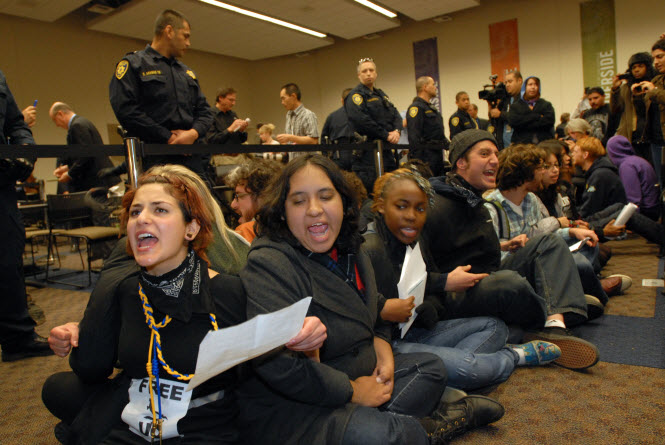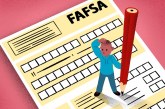 The polls were not looking good for Prop 30, as support was dwindling below the supposed magical 50% line, according to polls released just a couple of weeks before the election. But when the Field Poll was released, it seemed that the support for the tax measure was holding.
The polls were not looking good for Prop 30, as support was dwindling below the supposed magical 50% line, according to polls released just a couple of weeks before the election. But when the Field Poll was released, it seemed that the support for the tax measure was holding.
Despite this, many clung to their belief that Prop 30 was doomed. However, one of the big impacts of this election cycle was an online voting provision that led to a new record amount of voters. In the coming weeks and months, analysts, pundits and political scientists will be pouring over mounds of new data.
But one thing that stands out, one reason, perhaps the only reason Prop 30 gained a nearly 89 point and more than 700,000 margin, was that young people facing tuition hikes came out, and came out in droves.
According to a Reuters article, a reversal in historic trends on taxation can be tracked to the youth vote. Young people make up just 24 percent of the electorate but came out to the polls representing 28 percent of those who voted on Proposition 30. 65% of them voted yes.
Governor Brown worked feverishly, as the governor in his 70s made the tour of college campuses to turn out the youth vote.
UC Davis Chancellor Linda Katehi triumphantly said in a release: “I am gratified that a majority of California’s voters supported Proposition 30. Its passage prevents further financial damage to our campus, assures that our students will not face mid-year tuition increases and offers the potential to help return financial stability to both California as a whole and higher education specifically.”
She added, “I believe the passage of Proposition 30 also reaffirms the public’s recognition of the tremendous role higher education plays in educating our students and boosting our economy. I applaud voters for their decision to reinvest in California’s future.”
In a joint communication from UC President Mark Yudof and the chancellors of the UC System, they expressed relief in the passage of the measure and said, “The passage of Governor Brown’s budget initiative has created an opportunity to bring stability to the funding of public higher education in California.”
They add, “The task ahead of us now is to do everything possible to strengthen the capacity of the University to serve people in every part of the state through academic excellence and publish service.”
Despite this exuberance, there seems to be a problem. As the San Francisco Chronicle‘s Nanette Asimov reports this morning, despite the passage of Prop 30, fee increases and tuition hikes loom.
How can that be?
UC Spokesperson Steve Montiel told the Chronicle that Proposition 30 provided the state with “no windfall.”
Rather, he characterized it as: “It’s more like we avoided a hurricane.”
The Chronicle reports, “What Prop. 30 did guarantee was that tuition would not rise this school year.”
Wait a second, prior to the election, Chancellor Katehi wrote about the need for Prop 30.
“The November election ballot contains a measure, Proposition 30, which is sponsored by Gov. Jerry Brown and carries potentially profound implications for California higher education and for our students,” she writes. “The UC Regents have said that if Prop 30 passes, we will be able to hold the line on immediate tuition and fee increases. The governor has said the additional revenue could also help return stability to both California and higher education and begin to renew the kind of support UC has received in the past.”
“Everyone understands this is not a perfect solution. Opponents say that small businesses will be harmed and that Proposition 30 raises taxes on all Californians, not just the wealthy. Supporters say it will help stabilize the state’s finances and prevent further deep cuts to public education,” the chancellor continues. “However, there is no question that Proposition 30’s failure would result in the loss of an additional $250 million in state funding to both the CU and California State University systems. UC Davis’ share of the cuts could be $40 million.”
To that carrot she adds the stick, “To offset that loss, we would have to hit students with another annual tuition increase of roughly $2,000 or cut 285 faculty or 535 staff. Any of those options would hurt our students and further erode the quality of public higher education in the nation’s largest state, the state that drives our national economy in so many ways.”
The clear implication here was that the passage of Proposition 30 meant no more tuitition hikes.
But the Chronicle is reporting that a number of professional degree programs already face an increase in fees.
In addition, “The regents also will vote on a 2013-14 budget that would raise overall tuition by an unspecified amount unless the state augments UC’s budget by $126.5 million. That’s on top of $125 million that UC will get next year from Prop. 30 in exchange for not raising tuition this year.”
Students are already feeling duped.
A UC Berkeley student announced there would be a walk out. She said, “Prop. 30 was an attempt to pacify students. We demand that the money does actually go toward lowering tuition at UC and CSU.”
The officials at the University of California have often been tone deaf – raising tuition at the same time as they grant increases to top executives. But if they attempt to raise tuition next year after students came out in large numbers in support of Proposition 30, they risk more than just the appearance of dishonesty.
They risk making a whole generation cynical of the election process, and of the promises made by government officials in order to secure their vote. In short, they risk not only renewed violent demonstrations but a backlash – one that will harm the ability of any public official to pass a tax measure in the future.
The exit polling is quite clear that without the sizable youth vote delivering for Proposition 30, it would have ended up on the scrap heap of all other tax measures. It behooves the UC Regents, Governor Brown and the Democratic Legislature to figure out how to avoid this being the only tax measure that ever gets passed.
—David M. Greenwald reporting






“They risk making a whole generation cynical of the election process and the promises made by government officials in order to secure their vote.”
LMAO Did you seriously sit at your computer this morning and write this? Come on David, you must of been interupted by your kids and lost your train of thought or something.
More than you would know. But yes, I think that’s a huge risk here. Perhaps I should have said more cynical than they already are, but I believe that students came out to vote for 30 because they were told it wouldn’t increase their tuition and if it turns out that just gives them a one year reprieve, you won’t get their votes next time.
David
Your article describes the same reasoning I was trying to articulate late last night on the DTA post. As the students you describe, as a voter I feel that DJUSD and Measure E ‘duped’ me into thinking there would still be budgetary negotiations and discussions especially about the issues you raise in today’s DJUSD post. Your comments yesterday and these if UC today indicate ‘business as usual’. Voters passed yet another so carry on…..
I have a different perspective on this. I do not believe that young voters are so gullible as a whole as to think that one tax increase was going to cure all of our educational financial woes. I believe that they will ultimately realize that this was just one step in a long, long process of restoration of education as a major public priority. My evidence first personal, then national.
1) My daughter and her boyfriend, both recent Cal grads and avid Obama supports in 2008 were very disappointed in his performance due to their wildly unrealistic expectations of what a President could do in four years. Both however despite a recent dinner at which the groused and complained about his inadequacies, made sure that they voted for him again as did my 20 year old son and my partners two boys.
2) My more telling evidence however, is in President Obama’s 2012 youth vote. One of my biggest fears was that with their disappointment in the
President’s failure to fulfill all of his 2008 objectives, that young voters would be either too cynical or too apathetic to turn out for him a second time. I was very, very wrong. I should have had more faith in the understanding of our young people that societal improvement is a long, long gradual process and that it is not a matter of a single candidate, initiative, tax bill or election, but a matter of making your voice heard over and over. I think most young people when they get over their short term disappointment at this proposition not being a panacea will develope a more realistic attitude to the incremental nature of social and political change and will continue to vote their values.
There you go kids. Not only did you vote to tax your future job prospects down the drain. Your tuition will still go up. Your student loan debt will continue to pile up. And because you elected a Dem-union SuperMajority in CA State Legislature you will paying for generations of well-paid fat-pensioned public sector workers for the rest of your employment-challenged lives.